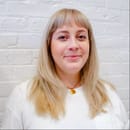Name: Sabrina Manville
Job Title and Description: Co-Founder, Edmit
College Name/Major: Yale University/Religious Studies
Website: www.edmit.me
Twitter: @sabrinamanville
What does your current job entail? Is there such a thing as a typical day?
SM: I co-founded a company called Edmit whose mission is to create greater price and value transparency for college-bound students and their families, helping students get the best value from their college choice. We are a very early stage company with only three full time employees, so every day is different! Some of what I do is very tactical, because we are all “doers” – for example, writing and sending email campaigns, signing off on blog posts, or setting up new pages or functionality on our website. But I also work on more strategic things, such as our venture capital fundraising, and forming partnerships with other organizations who can help us grow and reach our goals. I give input on the product and the data model that creates the pricing estimates, plus I get feedback from prospective customers on new ideas we have and help decide where we go next. I also manage several part-time team members and interns who help with specific projects or functions, and either manage or participate in the hiring process for all new Edmit hires.
What is the best part of your job?
SM: It is exhilarating to be making an idea come to life from nothing. The ability to help build things is a part of all great jobs, in my opinion, but it has special meaning when you were there from the time it was just an idea.
What was your first entry-level job in your field and how did you get it?
SM: My first job was at a telecommunications start-up company that no longer exists. It went under three months after I joined it, after the corporate investors decided to pull out of their share in the business. I got the job through a mentor who was a few years older than me and has helped advise me on my career path ever since (he had just joined the company at that time also). My other job offers were with organizations very much in my comfort zone, so non-profits and think tanks that valued my undergraduate liberal arts research and writing experience. But I wanted to do something totally different. I’ve never regretted risk-taking in the context of my career – especially early on, when there is nothing to lose and so much to gain.
What words of wisdom do you find most valuable?
SM: A professor I had in business school had a saying, “feedback is a gift.” It became a refrain with our class and is a very powerful message. If you are always seeking input from others on how to do better – whether those are your customers, coworkers, partners, friends – you will become a better person. Of course, most of us love positive feedback, but framing constructive criticism as a positive thing is not as easy. I work very hard to create opportunities for people to tell me how I could be doing better, especially people that work for me or directly with me. And I’m always working on how I respond to it, to not be defensive and to receive it thoughtfully and gracefully. That’s a lifelong project.
What is one mistake you made along the way and what did you learn from it?
SM: Now that I’m an entrepreneur, I have very tangible responsibility for the success of our company. But I’d argue that everyone should try to feel that level of ownership in whatever role they have. I think one of the mistakes I made early in my career was to think I was too junior to work on something, or too inexperienced to have an opinion. But when you’re smart and driven, in a good team everyone wants to hear from you -as long as you are respectful, self-correct as needed, and back it up with hard work.
When I worked in academic publishing, I learned about a start-up company that was developing software related to the work we did. I would send my boss memos every once in a while about how interesting that company was and how we should think about partnering with them. But it was no one’s job to form a partnership like that, and the leadership was busy with other strategic priorities. So nothing happened and I didn’t take more initiative. Since then, that company has raised over $15 million from venture capitalists and has millions of users. It could have been hugely impactful if I had been able to figure out a way for my non-profit to work with them when they were just getting started. What I learned: do you have an idea about someone your company should be working with? Go build that relationship or partnership. Do you see something that needs fixing? Go find the solution.
What has been the most surreal moment of your career thus far?
SM: I applied to a job in Africa when I was 26, and had never done anything like what the job entailed. It was a young social enterprise working with smallholder farmers and I’d be based in a small town on the coast of Kenya, managing the organization’s finances. I was so excited about the opportunity to work for a growing, mission-driven company and to have real responsibility on the ground for managing a team and building something new. But moving halfway around the world, without seeing where I’d be living or meeting anyone in person, was very scary. I remember thinking when I got there… what have I done? I felt so far from my comfort zone – literally and figuratively. But we are adaptable creatures. With plenty of help from my colleagues (one of whom is now my husband!) and I’m sure plenty of mistakes along the way, I settled in and worked with the organization for a year and a half, through lots of change and growth.
What do you look for when considering hiring someone?
SM: You need to have done your homework – the best interviewees aren’t just there for a job, but have an opinion about what my team and my company does, and to feel a passion for making it even better and more impactful. If you are applying to work for me you should have a few ideas of how you can help us from day one.
I also look for self-awareness and humility. I always ask about a piece of criticism a candidate has received. Everyone has opportunities to grow, but you’d be surprised at how many people can’t think of one! Either that, or they aren’t willing to tell me. If you are always looking to improve yourself and feel comfortable admitting when you fall short, I know you’ll be eager to learn from others and also be growing and contributing to an environment where the whole team is getting better and better at what we do every day.
What advice would you give to a 20-something with similar aspirations?
SM: Make connections with people you admire and simply ask for advice. When you’re young, you sometimes feel like you don’t have anything to offer in return, but the best connections and the best people are people who want to help you anyway. One of the top rules of networking is to support people who can’t give anything in return; your reputation and the good will that you build if you are someone who is generous, thoughtful and helpful is worth its weight in gold and lasts your entire career. So ask for help, but also look relentlessly for ways to help others.
My other piece of advice is to constantly strive for skills and expertise. You don’t have to know what you’re going to specialize in – in other words, you don’t need to know you’re a top marketer or a brilliant data scientist at this point in your career, but you should be aggressively seeking new skills and learning new things all the time. Always orient yourself towards the most learning and the most personal development that you possibly can.
What’s the one thing that’s stood out to you the most in a resume?
SM: Transitions. The choices you make, opportunities you’ve accepted or turned down, how you think about your career trajectory and what’s important to pursue next – those are often the most telling and insightful conversations I have in interviews. Usually the transitions that stand out on a resume have a story behind them that reveals something important about the person.


